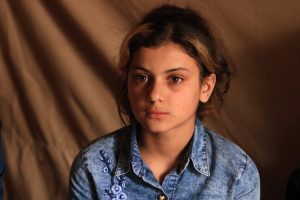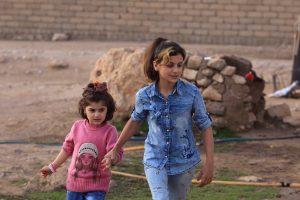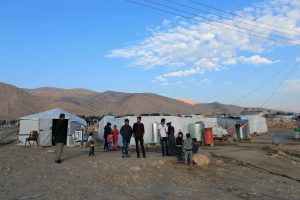
By Raya Jalabi and Ahmed Rasheed
BAGHDAD/ERBIL, Iraq (Reuters) – Five weeks after securing victory in Mosul, Iraqi forces have moved into positions around the city of Tal Afar, their next objective in the U.S.-backed campaign to defeat Islamic State militants, Iraqi military commanders say.
A longtime stronghold of hardline Sunni insurgents, Tal Afar, 50 miles (80 km) west of Mosul, was cut off from the rest of the Islamic State-held territory in June.
The city is surrounded by Iraqi government troops and Shi’ite volunteers in the south, and Kurdish Peshmerga fighters in the north.
About 2,000 battle-hardened militants remain in the city, according to U.S. and Iraqi military commanders. They are expected to put up a tough fight, even though intelligence from inside the city indicates they have been exhausted by months of combat, aerial bombardments, and by the lack of fresh supplies.
Islamic State’s self-proclaimed caliphate all but collapsed last month when U.S.-backed Iraqi forces recaptured Mosul after a brutal nine-month campaign. But parts of Iraq and Syria remain under its control, including Tal Afar, a city with a pre-war population of about 200,000.
Waves of civilians have fled the city and surrounding villages under cover of darkness for weeks now, although several thousand are estimated to remain, threatened with death by the militants who have held a tight grip there since 2014.
Thousands of troops stand ready at the frontline, awaiting orders from Prime Minister Haider al-Abadi to start the offensive, Iraqi army Major-General Uthman al-Ghanimi said this week.
TURKEY WORRIES
The main forces deployed around Tal Afar are the Iraqi army, Federal Police and the elite U.S.-trained Counter-Terrorism Service (CTS), Iraqi commanders told Reuters.
Units from the Shi’ite Popular Mobilization Forces (PMF), some of which are trained and armed by Iran, are also likely to take part in the battle, as well as volunteers from Tal Afar fighting alongside government troops, they said.
The involvement of the PMF is likely to worry Turkey, which claims an affinity with the area’s predominantly ethnic Turkmen population.
Tal Afar experienced cycles of sectarian violence between Sunnis and Shi’ites after the U.S.-led invasion of Iraq in 2003, and has produced some of Islamic State’s most senior commanders.
Iraqi forces have already begun conducting air strikes aimed at “wearing them down and keeping them busy,” Iraqi military spokesman Brigadier General Yahya Rasool said.
The coalition’s targets on Friday included weapons depots and command centers, in preparation for the ground assault.
The war plan provides for the Iraqi forces to gradually close in on the city from three sides — east, west and south — under the cover of air and artillery strikes.
Major General Najm al-Jabouri told Reuters last month he expected an easy fight in Tal Afar. He estimated fewer than 2,000 militants and their families were left there and they were “demoralized and worn down”.
“I don’t expect it will be a fierce battle even though the enemy is surrounded,” al-Jabouri said.
Residents who left Tal Afar last week told Reuters the militants looked exhausted.
“[Fighters] have been using tunnels to move from place to place to avoid air strikes,” said 60-year-old Haj Mahmoud, a retired teacher. “Their faces looked desperate and broken.”
But Colonel Ryan Dillon, a spokesman for the U.S.-led coalition, said he “fully expects this to be a difficult fight”.
“Intelligence gathered shows clearly that the remaining fighters are mainly foreign and Arab nationals with their families and that means they will fight until the last breath,” said Colonel Kareem al-Lami from the Iraqi army’s 9th Division.
But Lami said Tal Afar’s open terrain and wide streets will allow tanks and armored vehicles easy passage. Only one part of Tal Afar, Sarai, is comparable to Mosul’s Old City, where Iraqi troops were forced to advance on foot through narrow streets, moving house-to-house in a battle that resulted in the near total destruction of the historic district.
Lieutenant Colonel Salah Abdul Abbas of the 16th Infantry Division, said they were bracing for guerrilla street-fighting fight, based on the lessons learned in West Mosul.
CIVILIANS HAVE FLED
The United Nation’s International Organization for Migration (IOM), estimates that about 10,000 to 40,000 people are left in Tal Afar and surrounding villages. Iraqi commanders say the number of people left inside the city itself, including militants and their families, is closer to 5,000.
However, aid groups say they are not expecting a huge civilian exodus as most the city’s former residents have already left.
On Sunday, 2,760 people fleeing Tal Afar and the surrounding area were processed by the IOM before being sent on to displaced persons’ camps.
“We were living in horror and thinking of death at every moment,” Haj Mahmoud, the retired teacher, said. He decided to make a run for it with his wife and four sons and has been living with them at the Hammam al-Alil camp ever since.
Residents spoke of fleeing in the middle of the night to avoid the militants, who shot anyone caught trying to escape.
“We escaped at night, during evening prayers,” said 20-year-old Khalaf. “All the IS fighters were praying at the mosque, so they didn’t catch us. If they had, they would’ve sprayed bullets into our heads”, like they did his neighbors.
Khalaf said he fled five weeks ago with his two children and 40 other people from his village of Kisik. They walked for a full day to reach safety at a Peshmerga checkpoint.
“People in Kisik are completely trapped,” he said. “Those left tell us there’s no water, no food, no bread, no medicines – nothing.” Up until he left, 1kg bag of rice cost roughly $40.
Sultan Abdallah and his family escaped Kisik with Khalaf. They are now all living at the al-Salamiya refugee camp.
“We had spent three months with no food,” said Abdallah. He still has a brother, a cousin and an uncle left in Kisik, but he has not been able to speak to them since he left.
“You were forced to work for the militants to feed your family,” Abdallah said.
Saad al-Bayati fled Tal Afar five days ago with his family, fearing aerial bombardments. He is now living in the Hammam al-Alil camp with his wife and sick baby.
“I heard what happened in Mosul’s Old City, where whole families were killed by air strikes,” al-Bayati said. “I didn’t want to see my family buried under the rubble.”
(Additional reporting by Isabel Coles, Writing by Raya Jalabi, Editing by Angus MacSwan)












